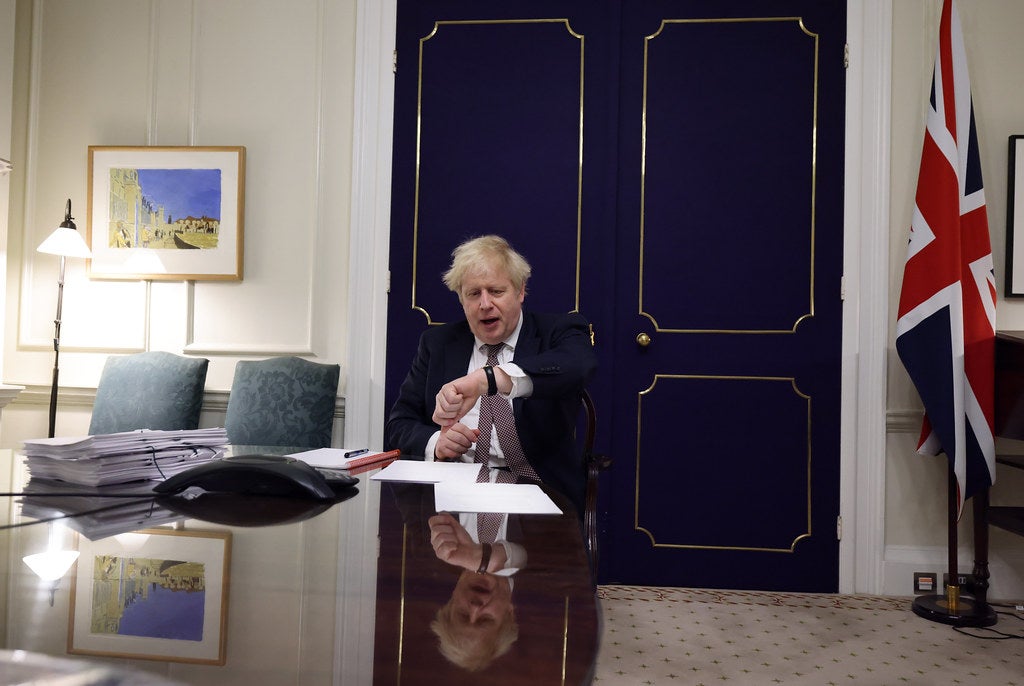How Brexit deal could force UK and EU to stick to tougher climate targets
Brexit deal is the first trade agreement to make the climate crisis a ‘make-or-break issue’, experts tell Daisy Dunne


Your support helps us to tell the story
From reproductive rights to climate change to Big Tech, The Independent is on the ground when the story is developing. Whether it's investigating the financials of Elon Musk's pro-Trump PAC or producing our latest documentary, 'The A Word', which shines a light on the American women fighting for reproductive rights, we know how important it is to parse out the facts from the messaging.
At such a critical moment in US history, we need reporters on the ground. Your donation allows us to keep sending journalists to speak to both sides of the story.
The Independent is trusted by Americans across the entire political spectrum. And unlike many other quality news outlets, we choose not to lock Americans out of our reporting and analysis with paywalls. We believe quality journalism should be available to everyone, paid for by those who can afford it.
Your support makes all the difference.Since Christmas Eve, when Boris Johnson finally secured a post-Brexit trade deal, politicians, trade experts and journalists alike have pored over the agreement, working out what it will mean for the future of travel, fishing and the trading goods for those in the UK and the EU.
But among its 1,255 pages, the final text also sets a precedent for climate – by specifically outlining both parties’ commitments to tackle the crisis as a key condition for future cooperation, experts tell The Independent.
“This trade deal contains the most ambitious climate language I’ve seen in any trade deal,” Dr Markus Gehring, a sustainable development lawyer and expert at the Centre for European Legal Studies at the University of Cambridge, tells The Independent. “The EU has a history of including references to the Paris Agreement, but this deal takes it one step further and makes it a make-or-break issue.”
The Paris Agreement is an international deal made in 2015 aimed at keeping global warming well below 2C above pre-industrial levels, with an aim of holding temperatures at 1.5C. As part of their commitments to tackle the climate crisis, both the UK and the EU have pledged to reach net-zero greenhouse gas emissions by 2050.
These pledges are outlined in the text of the new agreement, which says “each party reaffirms its ambition of achieving economy-wide climate neutrality by 2050”. The Brexit deal is the first trade agreement ever to feature climate targets in this way.
Nick Mabey, founding director of the climate think tank E3G, tells The Independent: “The inclusion of climate change as an ‘essential element’ of the EU-UK trade and cooperation agreement makes it a top level geopolitical and economic issue for both sides, and will be a precedent which should extend to other agreements with the US and China.”
The deal’s fine print also dictates that not taking sufficient action to reach net zero would be in direct breach of the trade agreement, Dr Gehring says.
“A material breach now also includes breaching your climate ambition,” says Dr Gehring.
“In my view this is the most significant element. It means if either of the two sides, the EU or the UK, completely deviate from their climate objectives, the entire agreement could be suspended or even terminated, depending on the seriousness of the breach.”
In other words, the Brexit deal puts a “political and economic price” on reneging on climate action, says Mr Mabey. This will increase the “bindingness” of the Paris Agreement and prevent “any attempt to attack climate action” by a “dwindling group of UK climate deniers”, he adds.
The text of the deal suggests that such a breach could lead to “immediate tariff consequences, subject to an expert and tribunal process”, says Dr Gehring.
“Trade consequences for not reaching your climate target is a novelty and, in my view, a very positive step,” he adds.
However, there are other sections of the agreement that are less encouraging, he says. For example, the deal appears to make no assessment of how changes to trade could impact existing environmental protections in the UK.
“The main concern is when you liberalise a lot of trade, it can have a detrimental effect on environmental protection or conservation objectives,” he says. “Only a precise impact assessment can tell you exactly what this impact will be. I think the public has the right to know that.”
For example, the introduction of a new product through the trade deal could have an impact on local wildlife, he says.
Environment impact assessments are usually the norm for new trade agreements, says Dr Gehring. However, it is possible that “the UK is so keen to strike all sorts of trade deals that they see impacts assessments as a major delay factor”, he adds.
It is also still not clear how the UK and EU will cooperate on carbon pricing after the UK leaves the EU Emissions Trading Scheme, a flagship element of the bloc’s climate policy, the experts say. The country’s replacement for pricing CO2, the UK Emissions Trading Scheme, is due to come into force on New Year’s Day.

Join our commenting forum
Join thought-provoking conversations, follow other Independent readers and see their replies
Comments